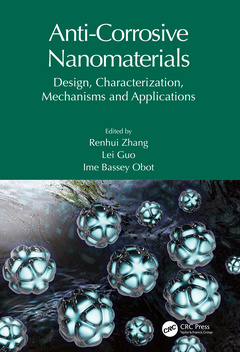Anti-Corrosive Nanomaterials Design, Characterization, Mechanisms and Applications
Coordonnateurs : Zhang Renhui, Guo Lei, Obot Ime Bassey

Corrosion is a great challenge in many industries, especially in the automotive, aerospace, and oil and gas industries, with conservative estimations accounting for losses of around 2.2 trillion US dollars per year in the United States alone. Providing a comprehensive overview of the history and development of nanomaterials, this book discusses various practices for protection against corrosion.
Key Features:
Provides a comprehensive and updated review of major innovations in the field of nanomaterials in industrial, corrosion, and environmental science and engineering
- Encompasses design, characterization, mechanism, and application of nanomaterials from different strategies on the efficacy and major challenges associated with successful scaleup designing
- Essential reference for present and future research in nanomaterials
- Includes relevant aspects of organic and inorganic nanomaterials, hybrid nanomaterials, and nanocoatings in anticorrosion applications
Coalescing a wide range of research on nanomaterials and anticorrosion practices, this book is of particular appeal to students, industry professionals, and academics.
Contents
- History and Development of Nanomaterials
- General Classification, Designing Principles, Synthesis Methods, and Potential Applications of Nanomaterials
- Corrosion Processes and Strategies for Protection
- Emerging Characterization and Analytical Techniques for Corrosion Research
- Anticorrosive Application of Graphene and its Derivatives
- Zero-Dimensional Carbon Dots as Anticorrosive Nanomaterial
- Fabrication and Applications of Fullerene-Based Anticorrosive Coatings
- Carbon Nanotubes & Nanofiber: Functionalization and their Applications in Corrosion Protections
- Metal-Organic Framework-Based Nanomaterials for Anticorrosive Applications
- Supramolecular Polymer Nanocomposites for Corrosion Control
- Recent Progress of MXene-based Nanomaterials for Corrosion Protection Nanomaterial
- Nanostructure Metals and Alloys for Corrosion Prevention
- Metal-Oxide Based Anticorrosion Nanocoating
- Nanoceramics for Enhanced Corrosion protection
- Stimuli-responsive Smart Nanocoatings for Autonomous Corrosion Monitoring and Control
- Organic-inorganic Hybrid Nanocomposite Coatings for Corrosion Protection
- Opportunities and Challenges for Molecular Simulation Machine Learning in Anticorrosive Nanomaterials
- Summary and Future Perspectives of Corrosion Protection at the Nanoscale: Economics, Commercialization, and Enivronmental Considerations
Renhui Zhang
School of Materials Science and Engineering, East China JiaoTong University, Nanchang 330013, China
Dr. Renhui Zhang works at the School of Materials Science and Engineering in East China JiaoTong University, China. He obtained his PhD in physical chemistry at the University of Chinese Academy of Sciences (UCAS), China. He is a member of American Chemical Society (ACS) and serves as reviewer and editorial board member for various internationally recognized platforms like ACS, RSC, Elsevier, Wiley, and Springer. Dr. Zhang is an Editor of Current Chinese Science. He is the author of several research and review articles published at ACS, Elsevier, RSC, Wiley and Springer etc. platforms. Currently, Dr. Zhang has participated in two books for Springer and Wiley. Dr. Zhang received several awards for his academic achievements.
Lei Guo
School of Material and Chemical Engineering, Tongren University, Tongren 554300, China
Dr. Lei Guo received his PhD in Chemical Engineering and Technology from Chongqing University, China in 2015. He is currently working as a Professor at the Department of Materials and Chemical Engineering, Tongren University, China. He has conducted a series of studies in various areas of the field of physical chemistry: electrochemistry, corrosion science, density functional theory, and molecular dynamic simulation. He has authored over 150 papers published in international journals (with h-index 35 and more than 4300 citations), 10 books, and 50 patents. He is also a member of the editorial boards of 10 international journals. He has recently focused on nanomaterials, organic corrosion inhibitors polymers, composites, and molecular simulation calculations. Dr. Guo received several awards for his academic achievements.
Ime Bassey Obot
Interdisciplinary Research Center for Advanced Materials, King Fahd University of Petroleum and Minerals (KFUPM),
Date de parution : 09-2023
17.8x25.4 cm
Thèmes d’Anti-Corrosive Nanomaterials :
Mots-clés :
Industrial nanomaterials; corrosion and nanomaterials; nanomaterials in environmental science; nanomaterials in environmental engineering; corrosive nanomaterials; PPy; Boron Nitride Nanosheets; Corrosion Inhibitors; Anticorrosion Ability; Nanocomposite Coatings; Anticorrosive Coatings; Superhydrophobic Coatings; Composite Coating; MOFs; Max Phase; Carbon Dots; Corrosion Inhibition Performance; Efficient Corrosion Inhibitors; Anti-corrosion Abilities; Cathodic Protection; Corrosion Resistance; Anti-corrosion Performance; Go; ZnO Nanorods; Halloysite Nanotubes; MOF Synthesis; High Entropy Alloy Coatings; Supramolecular Polymer; ZnO Nanocomposite Film; Fukui Index



